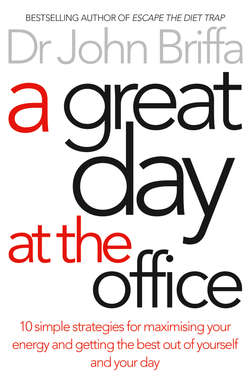Читать книгу A Great Day at the Office: 10 Simple Strategies for Maximizing Your Energy and Getting the Best Out of Yourself and Your Day - Dr. Briffa John - Страница 34
What’s the Big Idea?
ОглавлениеWhat should be the best diet for us humans? The answer, theoretically at least, is one based on the foods we’ve been eating the longest during our time on this planet. These are the foods we evolved to eat, after all, and are therefore those that we’re the best adapted to. It’s these foods, evolutionary biology dictates, that will likely suit our innate physiology and biochemistry the best, as well as our nutritional needs. Relative nutritional newcomers, on the other hand, are more likely to create a ‘mismatch’ with the natural order within us, and therefore compromise our wellbeing and health over time.
Evolutionists generally agree that our first truly human ancestors emerged about two and a half million years ago in Africa. From there, our earliest forefathers are believed to have made their way into colder regions lacking much in the way of edible vegetation, making meat-eating a necessity for survival. Direct evidence for meat-eating comes from patterns of wear and tear in the teeth of our early ancestors,16 as well as the discovery of stone tools and bones scored by cut marks which indicate that butchering of meat went on some two million years ago.17
Things changed when our ancestors began to settle in communities and cultivate grain crops such as wheat and corn. But when did this happen? The palaeolithic record tells us that agriculture began only 10,000 years ago. That sounds like a long time ago, but is it really in the context of the whole of human evolution?
One way to get a good overview of the timing of the addition of grains to the human diet is to imagine our evolution spread out over the course of a calendar year, with the first origins of human life starting on 1 January, stretching to the present day at midnight on 31 December. According to this scale, we were exclusive hunter-gatherers from 1 January until about midnight on 30 December. It was only on the last day of the year that we added grains to our diet.
Genetic change is generally a very slow process, and our genes have altered only a fraction over the last 10,000 years. In this context, one could rationalize that perhaps, theoretically at least, grains do not represent ideal foods for human consumption. But it’s not just a theory, because we’ve seen how grains are often highly disruptive to the body’s chemistry, and can contain substances such as phytates, lectins and gluten that pose other hazards for our health.
Actually, we have evidence from the very dawn of civilization that grains were not the best way to go from a nutritional perspective. For example, the addition of these foods into the diet was accompanied by a significant deterioration in our dental health18 and led to a sudden drop in height of some 4–6 inches.19
